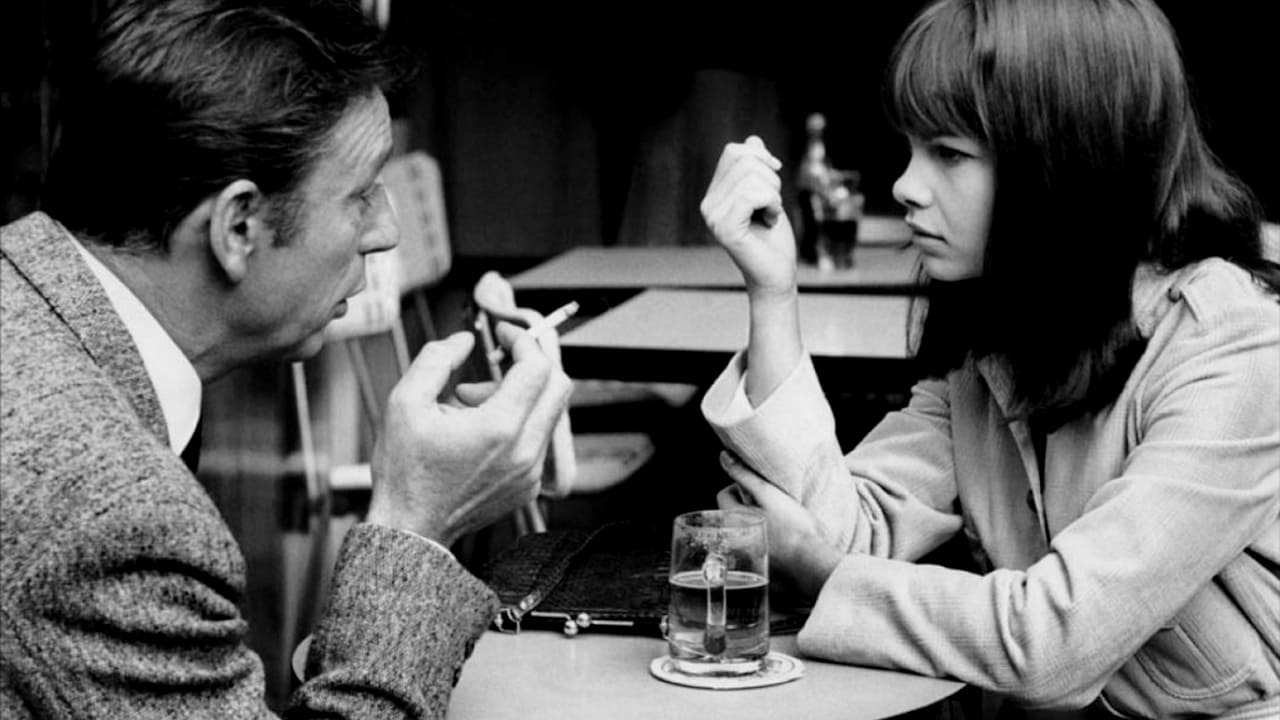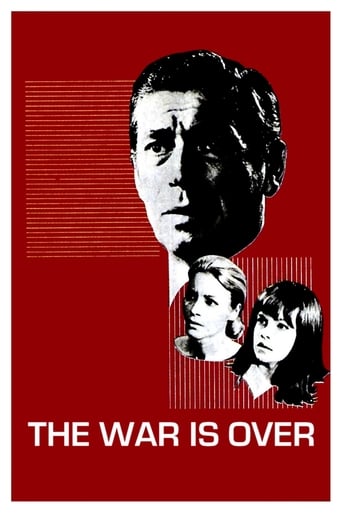



ridiculous rating
Plot so thin, it passes unnoticed.
Excellent, a Must See
It's funny watching the elements come together in this complicated scam. On one hand, the set-up isn't quite as complex as it seems, but there's an easy sense of fun in every exchange.
View MoreAlain Resnais was part of the so-called Left Bank of the French New Wave, alongside with Varda, Marker and Demy, who were politically much more aware compared to the film fanatics of Cahiers du Cinema (Rohmer, Truffaut, Rivette, Godard, Chabrol). Alain Resnais has always been interested in past but here he focuses on its impact with regards to the future. The War Is Over was his fourth feature, following Hiroshima mon amour, Last Year in Marienbad and Muriel, and still remains as one of the finest films of political cinema. The film builds around the theme of how to come to terms with one's past in order to live in peace with the present. No other place -- maybe Germany or Poland -- offers such a great setting for this but Spain because the shadows of the Civil War are so present. It is a milieu that has become the symbol of the war, so to speak.Diego Mora (Yves Montad) is an old man who spent his youth as a revolutionary in the Spanish Civil War. Now, thirty years later, he's part of a group that wants to redeem the dreams of the revolution in Paris. All the members of the group are living in the past, and so is Diego. But soon he has a moment of realization and breaks himself away from the chains of illusion and decides to make a change. Thus, The War Is Over is really a story about a man who is living a lie. It tells, rather bleakly in a melancholy tone, about old communists who can't let go off the past.The War Is Over might just be Resnais' most satisfying work when it comes to somewhat coherent viewing experience. It's his first film with a clear storyline which is relatively easy to follow even if the editing was deliberately (but not self-deliberate!) ambiguous and confusing. Resnais has succeeded perfectly to relay the flow of time. Moreover, through the character played by Yves Montand the viewer can understand the director's thoughts and emotions, no matter how shattered, because he holds the pieces together. It is he through whom the viewer constructs the big picture.In The War Is Over memories are created for the future. Alain Resnais doesn't try to build the horrors of the past by newsreel footage. He relays the tragedy of the conditions by showing how people are still living in the past, how they are left with unredeemed dreams in their hands. The dream has died in Spain. Of course, Spain is still there but merely as a concrete place full of tourists. People don't understand each other. There is a major breakdown in the communication between the old and the new left. Both are dreaming of a revolution but in their own ways. The legacy of the past torments the protagonist. However, he is not only forced to recall the past endlessly but also to be unable to understand the present reality.
View MoreI was less interested in the political drama, than in the subtlety of the acting and the psychological realities of the film. I saw the main character, Diego, in a quest for identity, attempting to make an impact in this world, and constructing much of his life in his imagination as a part of his strategy to stay alive. When asked if he was tired of lying (about his work as a revolutionary and his identity) he responds that he is not lying but constructing "barricades" (to insure his safety).His quest to conceal his identity and stay alive can be seen as a parallel to the multiplicity of personae that we assume in this life, thinking that this is the only way that we might survive our life's experiences and prevent loss. It is a universal illusion that we can control our destiny and avoid the loss of love, admiration, meaning and purpose.As counterpoint, what the other characters thought so important and so real...the overthrow of Franco, the police preventing the revolutionaries from accomplishing that task, having a child with Marianne, making love (personal and impersonal)...becomes meaningless to him. Diego (if even that is his "real" name) cannot live a "normal" life in Spain, but he cannot live anywhere else. He is a Spaniard and can be only that. He "solves" his dilemma: he becomes tired enough to move towards his capture and death. A poignant, painful, resonant narrative of a life.
View More"La Guerre est Finie" aka The War is Over (1966) from French master Alain Resnais, is a taut intellectual yet very much visual thriller. Yves Montand is in his mature prime, and Ingrid Thulin so quietly sensual, while Geneviève Bujold gave an impressive debut performance. Resnais' creative cinematic approach in rich visual play mixed with voice-over narration, aptly intensified the suspense. We're literally inside Montand's character Diego's head - thinking with him, seeing through his eyes, having memory tracking along with him in either flash back or flash forward. We feel Thulin's subtle moves as Marianne - a slight turn of her head, gentle extension of her neck, every movement so delicately modest yet sensual in volumes. Bujold's Nadine has such delicious youthful verve befitting the character - she is the exciting accent. Thulin and Bujold each has an intimate segment opposite Montand delivered in Resnais' unique and refreshing points of view. It is cinematic nuance truly savory and appreciation optimal.Cinematography in black and white by Sacha Vierny is poignantly appropriate - suspense would probably be lessen if delivered in color. Music score by Giovanni Fusco further ensured the distinctive quality of this film. You can tell this is no Hollywood thriller formula. In fact, the film can very well be a character study of Diego or a visual journey through the interplay of character relationships, yet it's suspenseful nonetheless. The beginning segment with veteran actor Michel Piccoli as the shrewd custom inspector questioning Montand's Diego certainly is tense as any other spy thriller yarn.The war in the title can very well be within Diego: to decide whether to continue this life of 'professional revolutionary' or to start anew a 'normal' life with Marianne. The dilemma also carries over to Marianne: to decide to stay in Paris or love conquers all in pursuit after Diego (to the point of being a matter of life and death, indeed). "The War is Over" may seem complex, but it's actually an easier to follow film than other Resnais endeavors. Give it a try. It's available on DVD. Caution: do ignore the dubbed in English alternative - it would not be the real thing, definitely non-flavorful. Experience the film in French with English subtitles.
View MoreI am thrilled that a DVD version of this nightmare has been released. After 36 long years I am able to show my friends what I have so often argued is the most horrible example of film making in all human history. I recently viewed it for the second time, the first being in 1966. Perhaps I was too young then to appreciate the subtleties or nuances of the film, its textures and complexities. Gimme a break, this thing plays worse now than it did then.The reason I firmly believe that this is the worst flick I've ever seen is that it actually takes itself seriously: It has a respected director (Resnais), stars the greatest French actor ever (Montand), and introduces the beautiful and talented Genevieve Bujold (oh those eyes). Throw in Ingrid Thulin (Bergman freaks know this talented woman) and the movie shouldn't miss. It does, it is just bad.There's a story in there somewhere wrapped around a few steamy (for the times) sex scenes and a delightful bit of on-camera puking (always fun). Mostly the movie tries to insult your sensibilities while engaging in a pointless and confusing character study of a frustrated middle-aged anti-Franco Marxist. The problem is the guy is shallow, there is no character to study. The rest of the people are very '60s Euro-lefties, very chic, and very uninteresting to all but themselves (and Resnais) in 1966 - I can't begin to imagine how boring they must be to modern audiences. If you want to be entertained while battling against old right-wing Spanish dictators grab yourself some Hemingway. Now there's a guy who could study character.When we left that theater in 1966 my date turned to me laughingly and said that if I lived a good life God would never make me see a movie that bad again. Apparently I've lived a good life. Listen, I've sat through Ed Wood productions and Anne-Margaret's "Kitten With a Whip" but "La Guerre Est Finie" remains the worst flick I've ever seen.
View More